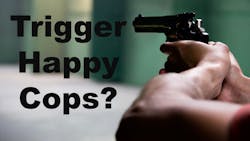Lately, the media is rife with reports about police officers shooting civilians. Some of those shot were armed, while some were unarmed. Regardless, the ubiquitous smartphone has created a problem for officer involved shootings. Media types seem quick to publicize videos that allegedly show officers shooting suspects with little or no justification. Later, when eyewitness or bodycam video is released showing officers were following the law, little attention is given to them and the damage has already been done.
Society is violent, more violent than at any other time in our nation’s history. Despite onerous restrictive gun laws in many major cities, thugs continue to be armed and ready to shoot whomever they want. The average citizen is left to fend for himself, unable to carry a weapon lest he be in violation of gun laws. The police suffer as well. With so many indictments and lawsuits brought about by shady lawyers trying to cash in on city coffers, some cops are hesitant to even draw their weapons except in self-defense. Despite facing situations in which deadly force is clearly authorized, officers hesitate. Why?
The temper of the times is such that police feel threatened from both thugs and city fathers. Will their actions be supported by their own bosses and/or the mayor/city council? Many times, the answer is no. Cops aren’t blind—they can see what’s happening not only in their own town, but also across the nation. Officers are being suspended, dismissed, and even prosecuted for good faith decisions made in the heat of the moment. Some are taking the position of only answering calls for service and taking their time getting there. Their mindset is such that if the city doesn’t want aggressive cops, I’ll simply show up and do only what is required.
Law enforcement officers are guided by their agency's deadly force policies. The cornerstone of most policies is that deadly force should be used only when it is reasonable and necessary to protect the officer or others from death or imminent serious physical injury. There are other qualifying statements as well, but safeguarding life is the common thread. However, even when there is a compelling reason to use deadly force, an officer may choose not to for other reasons. What the public doesn’t know is that officers are guided by their own deadly force policy as well.
While not generally discussed, the officer's personal deadly force policy (PDFP) many times overrides his department's deadly force policy. What? Yes, each of us has our own PDFP, and that is often more compelling than the department’s policy. All of us are influenced by many outside factors. Indeed, these things cause us to say what we say, and act the way that we do each day. What are some of these forces that imprint our behavior?
Most importantly is our upbringing. How your parents raised you has a profound impact on the rest of your life. If you had very strict parents, your tolerance for bad behavior is probably low. On the other hand, if your family life was very liberal, and the lines between acceptable and unacceptable behaviors were nebulous, your tolerance is probably much higher. Some households were very strict; the Bible was the moral compass that colored most deportment. Religious training develops a strong sense of morals and ethics that can guide one for a lifetime. A strong father that served as a role model for his children is probably the best example a young man or woman can have. Add into that mix of influencing factors that most police officers have an innate sense of fairness, and you have an individual that believes in giving everyone a fighting chance. Indeed, most officers will tell you that the last thing they ever want to have happen is to be compelled to use deadly force.
So, while we see how family life, morals, ethics, and culture mold an individual's ability to decide to use deadly force, there is also another factor to consider--confidence. A police officer can be fully within the law and policy of his department and still not be able to make that decision to use deadly force simply because he lacks confidence in his skills and abilities. He may be a marginal performer at firearms and tactical/role-playing scenario training. In fact, he may be the topic of locker room conversation that questions his ability to perform his duties on the street. Some officers will never be able to employ deadly force, even if their life or the life of their partner is in jeopardy.
Some officers spend their entire career without ever having to use their weapon to defend themselves or another. That is a blessing. Some officers among us are foursquare against killing another human being for any reason. PDFPs exist in every officer, but if they adversely affect his or her performance, it becomes a liability. Warriors need to stand shoulder to shoulder, secure in the knowledge that their brothers and sisters will do the right thing. The public needs to know that cops are normal people who have a job. They leave in the morning for work and expect to come home to their family when the job is finished. None of them leave for work hoping to be involved in a shooting that day.
Are there trigger happy cops? It’s highly unlikely, and it’s certainly not a crisis as some in the media make it out to be. The reality of law enforcement is that there may come a time when you must employ deadly force. Hopefully, your response will be appropriate and automatic based on your training.
Stay Safe, Brothers and Sisters!
About the Author
John Wills
John M. Wills is a former Chicago police officer and retired FBI agent. He is a freelance writer and award-winning author in a variety of genres, including novels, short stories and poetry. John also writes book reviews for the New York Journal of Books, and is a member of the National Book Critics Circle. His new book, The Year Without Christmas, is available now. Visit John at: www.johnmwills.com.

